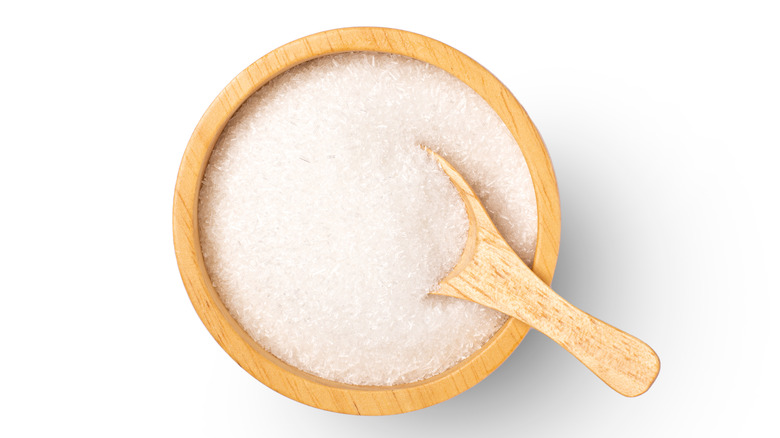Why Jet Tila Says You Should Use MSG In Every Dish
Monosodium glutamate, better known as MSG is something of a boogeyman for Western foodies, even if it is included in food items like Doritos and barbecue sauce. And while MSG is mostly produced in China, Indonesia, Vietnam, Thailand, and Taiwan, it isn't a hidden ingredient in Asian cooking. In fact, it is found in the dishes produced in just about every country on the continent — which is why you'd have a tough time explaining why the flavor enhancer is a problem to Asians.
It's no wonder then that Food Network star and celeb chef Jet Tila, who is known for his modern take on traditional Thai cuisine, considers MSG to be one of his "top three seasonings that make everything more delicious." In an attempt to bring awareness to the ingredient, he says on his Instagram page, "I'm here to bust that myth forever. [MSG] is not bad for you. You use it like salt, but it brings not just saltiness but expands all savoriness ... [it's a] magic dust that should be in every single dish."
While many of Tila's online recipes don't list MSG as an ingredient, this isn't the case with his cookbook, "101 Thai Dishes You Need to Cook Before You Die." In it, the celebrity chef lists MSG as an essential in every Thai kitchen and explains that it is a natural ingredient that you'd find in vegetables like "mushrooms, tomatoes, and seaweed."
Not a dirty word
Tila admits that while he has never used it in his restaurants, he does frequently when preparing dishes at home. He writes in his book, "Here's the thing. You can take it or leave it, but if I fail to add it or mention it, I'm not being an honest Asian cook. My grandmother used it, my parents used it, and I use it at home. This really makes it sound illicit, but the fact is, it helps hit that gold standard of Thai flavors, and I would be remiss if I left it out."
MSG was first discovered by Japanese chemist Ikeda Kikunae, who first realized that the world of flavor defined by sweet, sour, salty, and bitter had a missing component because there were some food items whose flavors fell outside of this range. The missing flavor, which he called umami, meaning "savory" or "deliciousness," could be found in foods like kelp or kombu, the main ingredient for dashi. Ikeda was able to isolate a chemical in kombu with the same properties as glutamic acid; that chemical, called glutamate, would eventually be added to salt and water to become monosodium glutamate, which he later sold under the Japanese brand Ajinomoto. Ikeda's discovery would earn him a place among Japan's greatest inventors.
So, as Tila advises, sprinkle the magic dust on your food because your tastebuds will thank you.

